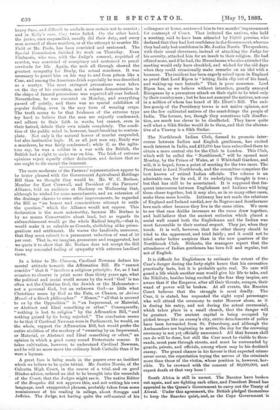In a letter to Mr. Chesson, Cardinal Newman defines his
mental attitude towards the Affirmation Bill. He " cannot consider" that it "involves a religious principle; for, as I had occasion to observe in print more than thirty years ago, what the political and social world means by the word ' God' is too often not the Christian God, the Jewish or the Mabometan- not a personal God, but an unknown God—as little what Christians mean by God as the Fate, or Chance, or Anima Mundt, of a Greek philosopher." " Hence," " all that is secured to us by the Opposition" is "an Impersonal, or Material, or Abstract and Ideal something or other." Consequently, "nothing is lost to religion" by the Affirmation Bill, "and nothing gained by its being rejected." The conclusion seems to be that if Cardinal Newman were in Parliament, be would, on the whole, support the Affirmation Bill, but would prefer the entire abolition of the mockery of "swearing by an Impersonal, or Material, or Abstract and Ideal something or other," an opinion in which a good many sound Protestants concur. It takes cultivation, however, to understand Cardinal Newman, and he will no more move the ordinary Irish Catholic than if he were a layman.


































 Previous page
Previous page